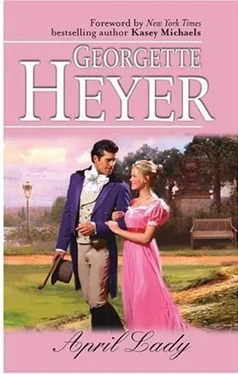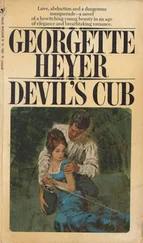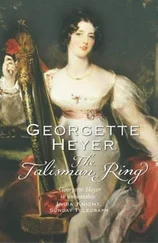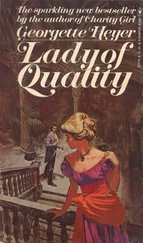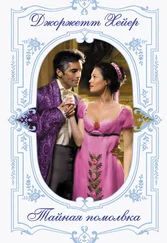Her thoughts were very far from Letty’s affairs, but she answered mechanically: “Yes, she told me of his appointment.”
He regarded her with a slight crease between his brows. “You are looking very troubled, Nell. Why? Are you taking this nonsense to heart?”
Now, if ever, was the moment to tell him that the page had not yet been stuck down. The words refused to be uttered. She said instead: “I can’t help but be sorry for them. I know it is a bad match, and indeed, Cardross, I understand what your sentiments must be.”
“I imagine you might! To be wishing Letty joy of a shockingly bad bargain would be fine conduct in a guardian! To own the truth, I wish I were not her guardian—or that I had never permitted her aunt to take charge of her. That woman wants both manner and sense, and, as far as I can discover, reared her own daughters as well as my sister in a scrambling way, encouraging them in every extravagant folly, and allowing them to set up their flirts when they should have been in the schoolroom!”
“Well, yes,” admitted Nell. “I don’t like to abuse her, for she is always very civil and goodnatured, but she does seem to be sadly shatterbrained! But I can’t suppose that she encouraged Mr. Allandale, for she doesn’t at all wish Letty to marry him, you know. She talked to me about it the other evening, at the Westburys’ drum, and she seemed to feel just as she ought.” She paused, considering this. “At least,” she amended, “just as you think she ought, Cardross.”
He was amused. “Indeed! But not as you think, I collect?”
“Well, not precisely,” she temporized. “I must say, it has me quite in a puzzle to understand how it comes about that such a lively girl should fall in love with Mr. Allandale, for he is not at all sportive, and he doesn’t seem to have more than common sense, besides having such very formal manners,—but—but there is nothing in his disposition to make him ineligible, is there? I mean, it isn’t as if she wished to marry someone like Sir Jasper Lydney, or young Brixworth. And one wouldn’t have felt the least surprise if she had, because they have both been dangling after her ever since she came out, and no one can deny that they have very engaging manners, in spite of being such shocking rakes! You would not have liked her to marry either of them!”
“I should not, but there is a vast gulf between Brixworth and Allandale, my love! As for eligibility, though there may be nothing in Allandale’s disposition to dislike, there is nothing in his circumstances to recommend him. He has neither rank nor fortune.”
“Letty doesn’t care for rank, and she has fortune,” Nell pointed out.
“Unequal marriages rarely prosper. Letty may imagine she doesn’t care for rank: she doesn’t know how it would be to marry a man out of her own order.”
Nell wrinkled her brow over this. “But, Giles, I think she does know!” she objected. “For it is not as if she had been accustomed all her life to move only in circles of high fashion. Mrs. Thorne is perfectly respectable, but not at all exclusive, and you yourself told me that Letty’s mama was not of the first rank.”
“You are a persuasive advocate, Nell! But I must hold to my opinion—and to what I conceive to be my duty. I have said that I won’t withhold my consent, if both are of the same mind when Allandale returns from Brazil, and that must suffice them. I shan’t conceal from you that I hope Letty, by that time, will have transferred her affections to some more worthy object.”
“You want her to make a good match, don’t you?”
“Is that so wonderful?”
“Oh, no! Perhaps, if she doesn’t see Mr. Allandale for some years, she will do so. Only—only—it would be so very melancholy!”
“My dear child, why?”
She tried haltingly to express the thought in her mind. “She loves him so much! And I cannot think that she would be happy if she married—only to oblige her family!”
His brows had drawn together. He said harshly: “As you did?”
She stared at him almost uncomprehendingly. “As—as I did?” she faltered.
A smile, not a very pleasant smile, curled his lips. “Had I not been possessed of a large fortune, you wouldn’t have married me, would you, Nell?”
She was conscious of a pain at her heart, but she heard him without resentment. She thought of her debts, and of those mysterious Settlements, and could only be thankful that she had not disclosed to him Madame Lavalle’s bill. Its existence weighed so heavily upon her conscience that she found herself unable to utter a word. A deep flush stained her cheeks, and her eyes, after a hurt moment, dropped from his.
“You must forgive me!” His voice had an ironical inflexion that made her wince. “My want of delicacy sinks me quite below reproach, doesn’t it? I fancy it gave Allandale a disgust of me too.”
She managed to say, in a stifled tone: “I didn’t think—I didn’t know about your fortune!”
“Didn’t you?” he said lightly. “How charming of you, my dear! Your manners make mine appear sadly vulgar. Don’t look so distressed! I am persuaded no man ever had so beautiful, so polite, or so amiable a wife as I have!” He glanced at his watch. “I must go. I don’t know what nonsense Letty may have taken into her head, but I hope I may trust you not to encourage her in it. Happily, it appears to be out of Allandale’s power to marry her without a substantial portion. She’s under age, of course, but I’d as lief not be saddled with that kind of a scandal!”
A smile, a brief bow, and he was gone, leaving her with her brain in a whirl. There was little thought of Letty in it. For the first time in their dealings Cardross had hinted that he had looked for more than complaisance in his wife; and his words, with their edge of bitterness, had made Nell’s heart leap. It was almost sacrilege to doubt Mama, but was it, in fact, possible that Mama had been wrong?
She went slowly upstairs, to be pounced on by Letty, bursting with indignation, and the desire to unburden herself. She listened with half an ear to that impassioned damsel, saying yes, and no, at suitable moments, but assimilating little from the molten discourse beyond the warning that her sister-in-law would be forced to take desperate measures if Cardross continued on his present tyrannical course. Before it had dawned on Letty that she had no very attentive auditor to the tale of her wrongs a message was brought up to the drawing-room that the Misses Thorne had called to take up their cousin on a visit to some exhibition.
Nell soon found herself alone, and at leisure to consider her own problems. These very soon resolved themselves into one problem only: how to pay for a court dress of Chantilly lace without applying to Cardross. If Cardross had offered for her hand not as a matter of convenience but for love, this was of vital importance. Nothing could more surely confirm his suspicion than to be confronted with that bill; and any attempt to tell him that she had fallen in love with him at their first meeting must seem to him a piece of quite contemptible cajolery.
No solution to the difficulty had presented itself to her by the time the butler came to inform her that the barouche had been driven up to the door, and awaited her convenience. She was tempted to send it away again, and was only prevented from doing so by the recollection that civility obliged her to make a formal call in Upper Berkeley Street, to enquire after the progress of an ailing acquaintance.
She directed the coachman, on the way back, to drive to Bond Street, where she had a few trifling purchases to make; and there, strolling along, with his beaver set at a rakish angle on his golden head, and his shapely legs swathed in pantaloons of an aggressive yellow, she saw her brother.
Читать дальше
